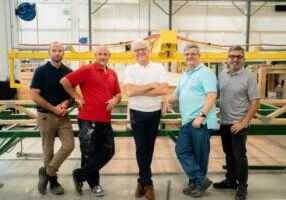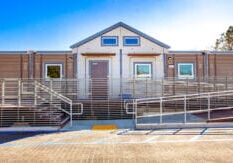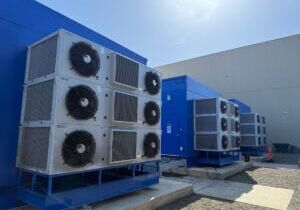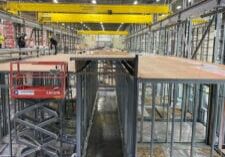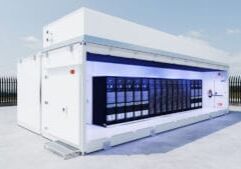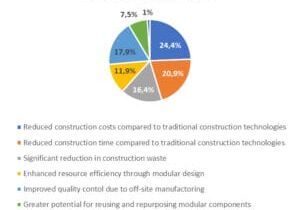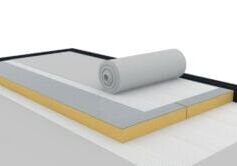Only the Future is at Stake
A new report from Anirban Basu, chairman & CEO of Sage Policy Group and Chief Economist of the Modular Building Institute

Anirban Basu is chairman & CEO of Sage Policy Group and Chief Economist of the Modular Building Institute
Climate Debates Get Heated
As of this writing, many of the world’s leaders are engaged in discussions at the 28th meeting of the Conference of the Parties to the United Nations Framework Convention on Climate Change, known simply as COP28. This year, the President of COP28 is none other than Sultan Al Jaber of the United Arab Emirates (UAE), who got the festivities started by suggesting that there is “no science” indicating that a phase-out of fossil fuels is required to restrict global temperate increase to 1.5 Celsius or 2.7 degrees Fahrenheit.
Many disagreed, loudly. As indicated by The Guardian, more than 100 nations already support phasing out fossil fuels. Whether the final COP28 agreement will call for a phase-out or will adopt diluted language is one of the most contentious issues at the summit.
As with many economic matters, there is underlying the tension between social goals and perceived economic well-being. For oil producing nations, the move away from fossil fuels represents something approaching an existential threat. According to the US Energy Information Administration’s International Energy Statistics database, the UAE was the world’s seventh-largest total liquid fuels producer in 2022 and third largest among OPEC members.
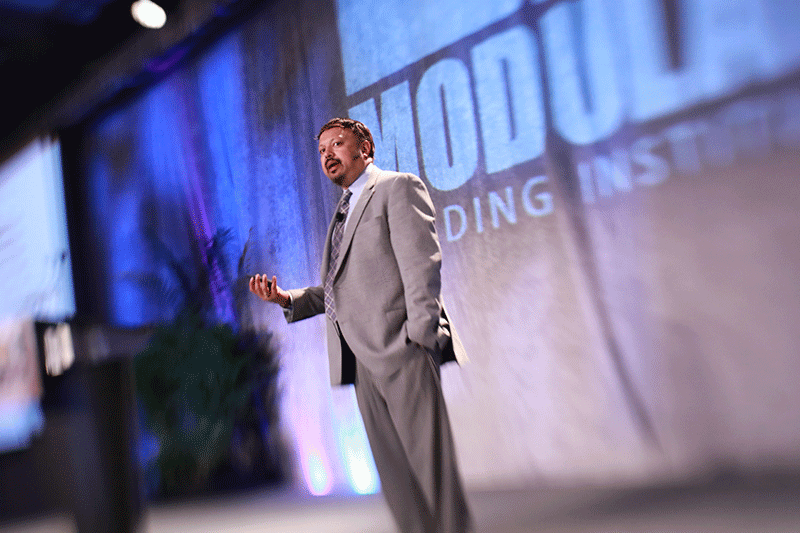
Anirban Basu speaks at MBI's annual World of Modular conference and tradeshow.
The movement away from fossil fuels also represents a source of inconvenience and cost among many American households. Many Americans like the flexibility and associated range of their gasoline-fired V-6s and V-8s. They like their gas stoves, propane-powered grills, and the rumble of a lawnmowers. Electrification would require abandoning many of the appliances and vehicles to which Americans have become accustomed. The transition to electric appliances and vehicles also stands to be expensive, as does electricity as utilities also shift away from fossil fuels.
For many onlookers, the world is engaged in a race. If the movement toward cleaner, greener economic activity takes too long, the world will suffer. While there are climate change skeptics, many leading scientists have concluded that the world will be fundamentally altered if the world warms by 1.5 degrees Celsius or more. Some conclude that at 1.5 degrees Celsius, 70 to 90 percent of coral reefs will die globally. At 2 degrees, the figure rises to approximately 99 percent. About 500 million people depend on those reefs for both food and livelihoods according to information acquired by NPR climate correspondent Lauren Summer.
Still others warn that at 1.5 degrees Celsius, the Greenland Ice Sheet would collapse, altering ocean currents. Degradation of the Amazon rainforest would further elevate emissions. Flooding would become rampant, destroying waterfront communities and tax bases in the process. Some scientists believe that the world is destined to surpass 1.5 degrees Celsius of warming, and the question is really what can be done to get the globe back to workable temperatures.
How Modular Building Can Help
Construction is infamous among the pantheon of industries in terms of its resistance to change. It is associated with slow productivity growth and modest evolutions in the mechanisms by which construction services are delivered. The reluctance to change is evident in the, which suggests that modular’s market share is edging higher as opposed to ramping higher aggressively.
That may be about to change, and environmental conditions have much to do with that. The bad news is that building operations and construction account for nearly 40 percent of global energy-related CO2 emissions. The good news is that changes in how construction services are delivered can supply major benefits in the war on climate change.
Environmental implications extend beyond waste produced. Noise pollution from construction sites disrupts local ecosystems, including impacting wildlife communication and behavior. Moreover, the industry stands as a major global consumer of resources, a fact highlighted by European Union data indicating that building construction consumes 40 percent of materials and primary energy while generating 40 percent of waste. Traditional construction techniques also impact water quality by injecting diesel, fossil fuels, paints, solvents, and other toxic chemicals into the environment.
Enter modular construction. By prefabricating components in a controlled factory setting, modular building minimizes waste, reduces onsite construction activities, and, as a result, significantly lowers overall environmental impacts. A noteworthy study by Professor Mohammed Al-Hussein at the University of Alberta reveals that modular construction could cut CO2 emissions by 43 percent on standard projects. This reduction is attributable to efficient use of resources and reduced construction time associated with modular methods.
There is more. A peer-reviewed study published in the Journal of Industrial Ecology and conducted by the University of Virginia indicates that modular homes typically use about 17 percent less material. If one extends that result to global housing requirements, the implications are mind-bending.
Looking Ahead
The Modular Building Institute along with other sources of leadership have been advocating for modular construction along several key dimensions, including cost containment, delivery speed, precision, appeal to emerging workforce members, and now the environment. As the race to reverse global warming intensifies, there is little doubt that modular techniques will be adopted with far greater frequency than has been the case to date. Meanwhile, modular building continues to offer its more traditional benefits to project owners, but the issues facing society are far more pressing these days than simply helping project owners make their pro-formas pencil out.
More from Modular Advantage
Resia: Breaking All the Rules
Resia Manufacturing, a division of U.S.-based Resia, is now offering prefabricated bathroom and kitchen components to industry partners. Its hybrid fabrication facility produces more precise bathroom and kitchen components (modules) faster and at lower cost than traditional construction. Here’s how Resia Manufacturing does it.
How LINQ Modular Innovates to Bring Modular To The Market in the UAE and Beyond
LINQ Modular, with an office and three manufacturing facilities in Dubai, is a modular firm based in United Arab Emirates. The company is on a mission: to break open the housing and construction markets in the Gulf Cooperation Council (GCC) area with modular.
ModMax: Redefining Modular Construction with Confidence and Precision
ModMax was born out of frustration—frustration with five persistent pain points in modular construction: Permitting bottlenecks. Production delays. Rigid designs. Disconnect between “the office” and the field. Lack of transparency and communication.
LifeArk: Disaster-Resilient Housing from Recycled Plastic and 100-year-old Technology
Wee compares LifeArk’s housing units to Yeti coolers, as they are built similarly. Each component takes 15 to 20 minutes to manufacture, has an R-value of 40, and includes molded slots and chases for wiring, plumbing, fire sprinklers, and other utilities.
Building the Future of Modular Edge Infrastructure
The edge data center market is expanding rapidly, driven by the surge in AI workloads, IoT adoption, and the need for localized compute power. In these environments, sustainability, scalability, and reliability are non-negotiable. Cooling is among the most complex challenges for operators—and one of the most decisive factors in long-term success.
Accelerating Light-Gauge Steel Construction: A Semi-Automated Digital Workflow for Off-Site Projects
For construction professionals, the message is clear. By adopting semi-automation and digitalization, companies can deliver projects faster, more accurately, and more profitably, while also building stronger collaboration across teams. The approach is not about replacing people with machines, but about empowering people with better tools and processes.
Why Modular Data Centers Are Gaining Momentum
Artificial intelligence, high-performance computing, and edge applications push the limits of traditional “stick-built” data centers. They take years build, often struggle with high density workloads, and aren’t optimized for deployments near end users. Modular data center platforms are purpose-built to address these challenges, offering flexibility and scalability to adapt to evolving technologies, while opening new opportunities for the modular construction industry.
Supply Chain Innovation in Action: 5 Habits Every Modular Leader Should Practice
By applying these principles to supply chain practices — collaborative planning, strategic procurement, scenario modeling, digital tools, and transparent forecasting — construction leaders can build value chains that are not just efficient and agile, but truly innovative.
Exploring the Role of Modular Integrated Construction (MiC) in Advancing Circular City Principles – A Survey of Stakeholder Perspectives
The survey findings highlight the significant potential of Modular integrated Construction (MiC) in advancing the development of circular cities. By reducing costs, accelerating construction timelines, and minimizing waste generation, MiC offers a promising approach to sustainable urban development.
The Use of MS POLYMER™-Based Sealants and Adhesives in Modular Building
These products combine flexibility and elastic recovery with excellent adhesion to different substrates and have already shown their usefulness in traditional construction. Now it’s time for them to be put to use in the modular construction industry.



